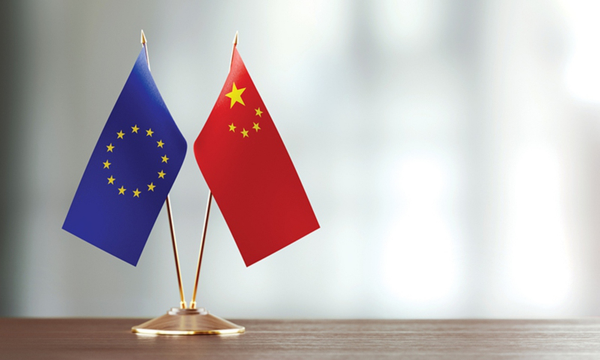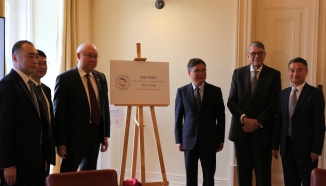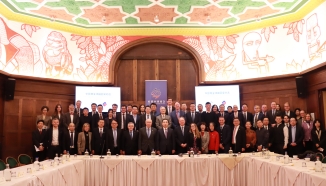CCCEU Weekly Update 17 January 2025 | China-EU Summit expected “later this year”; Xi, Trump speak by phone on Friday

Editor's Note: As the Chinese New Year approaches, China-EU relations are marked by both diplomatic engagement and economic tension. President Xi Jinping's call with European Council President Costa set the stage for a planned China-EU summit, while EU Trade Commissioner Šefčovič's meeting with Ambassador Cai Run highlighted ongoing dialogue. However, economic friction persists: the EU seeks to tighten foreign investment reviews, unveiled findings of its IPI investigation, and imposed anti-dumping measures. China instead initiated an anti-dumping probe. Moreover, on Friday, President Xi held a telephone conversation with U.S. President-elect Donald Trump. Enjoy your read!
Focus
As the new year begins, China-EU relations appear to be shifting toward a more constructive dialogue. On January 14, Chinese President Xi Jinping and European Council President António Costa held a pivotal phone call, marking Costa's first direct engagement with Chinese leadership since taking office in December 2024. Initiated by Brussels, the call underscored Costa's pragmatic approach to bolstering dialogue with Beijing. Describing the exchange as "constructive," Costa emphasized the importance of EU-China engagement for addressing global challenges.
The conversation's tone signaled an intent to move beyond prior rhetoric from some EU officials, who had suggested using China-EU relations as leverage in broader geopolitical negotiations with the United States. Following the call, Costa announced a China-EU summit on the occasion of the 50th anniversary of diplomatic ties.
The summit, the first to return to Brussels in six years, is widely seen as an opportunity to strengthen cooperation on trade, climate change, and global governance. On social media, Costa said he looked forward to the summit, expected "later this year."
The announcement has been welcomed by many in both Europe and China as a chance to reset and engage on pressing issues. For China, the EU remains a critical partner in trade, innovation, and geopolitical strategy. However, lingering economic tensions present significant hurdles to deeper cooperation.
This week, the European Commission released its inaugural International Procurement Instrument (IPI) investigation report, alleging that European companies face discriminatory practices in China's public procurement processes in the medical sector. The Commission also suggested potential countermeasures.
In the meantime, the EU has recommended that member states tighten scrutiny of foreign investments, especially in sensitive sectors like artificial intelligence, as part of broader efforts to bolster economic security. While non-legislative, this move has raised concerns among businesses and analysts over the risk of heightened barriers to investment flows between Europe and China.
Adding to these tensions, the European Commission has continued to impose anti-dumping measures on certain Chinese imports. As for China, it announced anti-dumping measures targeting copolymerized paraformaldehyde imports from the EU, U.S., Taiwan, and Japan on Thursday. This tit-for-tat highlights the persistent challenges in the economic relationship.
Despite these difficulties, trade remains a cornerstone of China-EU relations. Bilateral trade has grown significantly, now exceeding €20 billion daily, making the EU one of China's largest trading partners. Both sides recognize the strategic implications of their economic ties and the broader geopolitical context in which these relationships are evolving.
Diplomatic engagement also continues at various levels. EU Trade Commissioner Maroš Šefčovič, known for advocating tough trade policies toward China, is scheduled to meet Chinese Ambassador to the EU Cai Run on January 17. Their discussions are expected to pave the way for further negotiations and consultations. These ongoing dialogues will be instrumental in shaping the trajectory of China-EU relations in the months ahead.
While economic frictions persist, the diplomatic overtures this week offer a promising signal. The planned 2025 China-EU summit, along with continued engagement, presents a critical opportunity to deepen economic interdependence while navigating the complexities of trade, technology, and geopolitical tensions.
In an increasingly multipolar world, China and the EU will remain pivotal players in shaping the global landscape. Their ability to balance collaboration and competition will not only define their bilateral relationship but also influence the broader contours of international relations in the years to come.
Hot Topics
Xi, Trump hold phone talks
Chinese President Xi Jinping spoke by phone with U.S. President-elect Donald Trump on Friday, according to Xinhua News Agency.
Meanwhile, China's Foreign Ministry announced that Vice President Han Zheng, serving as President Xi's special representative, will attend Trump's inauguration onJanuary 20 in Washington, D.C., following an invitation from the U.S.
China reports 5% GDP growth in 2024
China's gross domestic product expanded by 5 percent in 2024 - meeting the country's preset annual growth target of around 5 percent, fueled by a slew of policy measures taking effect gradually last year, official data showed on Friday.
The country's annual GDP came in at 134.9 trillion yuan ($18.4 trillion) in 2024, according to the National Bureau of Statistics. For the fourth quarter of 2024, the Chinese economy grew 5.4 percent year-on-year, following a 4.6 percent growth in the third quarter.
China never requires firms, individuals to legally supply data gathered abroad, FM responds to Austrian group's privacy complaints in EU
China has never required, and will never require, companies or individuals to collect or provide overseas data or intelligence to the Chinese government in violation of local laws, Foreign Ministry spokesperson Guo Jiakun stated at a regular press conference on Friday, according to Global Times.
The remarks came in response to media inquiries about complaints filed by the Austrian organization Noyb in several EU countries, accusing six Chinese companies of "illegally" transferring EU user data to China.
Media: Chinese buyers interested in "unwanted" German Volkswagen factories
Chinese officials and automakers are eyeing German factories slated for closure and are particularly interested in Volkswagen's sites, a person with knowledge of Chinese government thinking told Reuters.
China, EU trade anti-dumping measures
China said on Thursday it would apply provisional duties on imports of industrial plastics from the United States,EU, Japan and Taiwan after a months-long anti-dumping investigation.
On the same day, the European Commission said it will impose anti-dumping duties on imports of sweetener erythritol from China.
Brussels to hold Chinese Spring Festival Fair on Jan. 25
Mark your calendars! A vibrant Chinese Spring Festival Fair is set to take place on January 25 from 10 :00 AM to 4 :00 PM at the iconic Parc du Cinquantenaire, promising a day of cultural celebration and excitement.
What are experts talking about?
Mar-a-Lago Guest List Hints at Trump's Agenda
Source: China - US Focus
Author: An Gang, Adjunct Fellow, Center for International Security and Strategy, Tsinghua University
Ever since Donald Trump won the 2024 presidential election in the United States, his home and political base — Mar-a-Lago resort in Palm Beach, Florida — has been a hub of continuous celebration. In addition to hosting various domestic groups, Trump has broken with traditional U.S. electoral norms by openly welcoming foreign dignitaries and their representatives.
In recent years, the most critical bilateral relationship in the world has deteriorated rapidly as it has been reframed under the unilateral strategic competition narrative set by Washington. The scope for cooperation has narrowed significantly, and the trend toward decoupling has become more evident. Nevertheless, a certain level of restraint has been maintained, and direct military conflict has been avoided. Changes in America's political landscape are likely to introduce a new agenda and a revised logical framework for decision-making. While no one harbors unrealistic expectations for a fundamental improvement in the relationship, it is also undeniable that a rebound after the steep decline is possible, even if only on a local level, influenced by internal and external factors.
Regardless of the specific actions Trump may take toward China after assuming office, one thing is clear: All policies enacted by both China and the United States toward each other will originate from their respective domestic priorities. For China, core national interests are non-negotiable, but strategic competition does not necessarily mean intense confrontation. The next chapter in Sino-U.S. relations presents both risks and opportunities, with the essence and boundaries of this relationship poised for redefinition.
Trump and the Europe-US-China Triangle
Source: Rhodium Group
Authors: Noah Barkin and Agatha Kratz
The return of Donald Trump to the White House represents a multi-dimensional challenge for Europe. Trump is promising to hit European countries with broad-based tariffs, curtail US support for Ukraine, and seek sharp increases in European defense spending. Elon Musk's support of European far-right parties and an emerging alliance between Trump and US tech firms is likely to further test Europe's resilience and unity. European leaders are scrambling to minimize the damage. Several have met with Trump since his election victory to warn against a bad peace deal for Ukraine. Meanwhile, the European Commission has prepared a welcome package for the Trump team in the hope of heading off a transatlantic trade conflict. How the standoff plays out will have major implications for transatlantic relations, Europe's relationship with China, and broader G7 unity in the face of mounting economic and security challenges coming from Beijing.
Please note: the English version of this issue is slightly different from our Chinese one. The views and opinions expressed in this article do not necessarily reflect the official position of the CCCEU.

 Login
Login Login
Login CCCEU Launches Automotive Working Group in Lisbon | 2025 Portugal-China & Europe-China Cooperation Development Forum Successfully Held
CCCEU Launches Automotive Working Group in Lisbon | 2025 Portugal-China & Europe-China Cooperation Development Forum Successfully Held CCCEU, EUCCC Host 3rd EU-China Business Leaders Roundtable Dialogue
CCCEU, EUCCC Host 3rd EU-China Business Leaders Roundtable Dialogue



